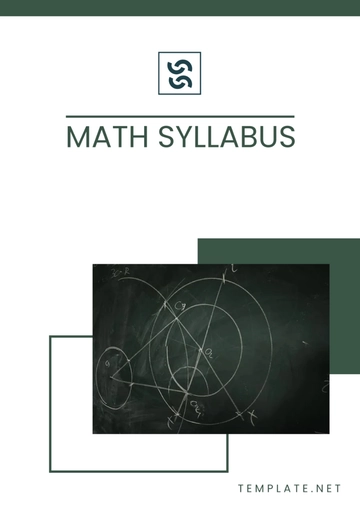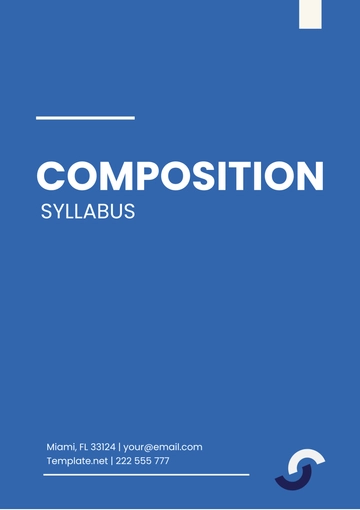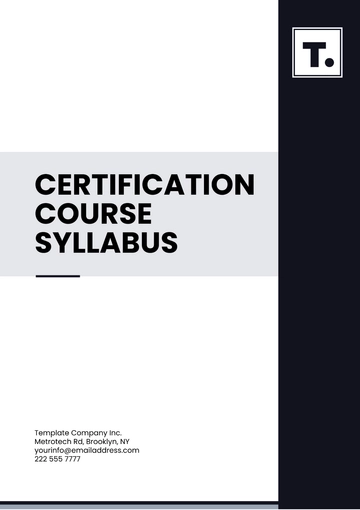Free Electrical Engineering Syllabus

Electrical Engineering Course
Course Title | [COURSE TITLE] |
Course Code | [COURSE CODE] |
Class Location | [CLASS LOCATION] |
Class Time | [CLASS TIME] |
Class Duration | [DATE] - [DATE] |
1. Course Description
This course is an introduction to the principles of electrical engineering, focusing on the fundamental concepts related to electrical circuits, electromagnetism, semiconductor devices, and power systems. It is designed to provide a solid foundation for further studies in electrical engineering.
2. Instructor Information
Instructor: [YOUR NAME]
Contact: [CONTACT INFORMATION]
Office Hours: [OFFICE HOURS]
3. Learning Objectives
Understand and apply the principles of circuit analysis.
Understand electromagnetic fields and their applications.
Identify and describe the characteristics of semiconductor devices.
Understand power systems and the principles of electrical power generation.
Develop analytical skills to solve electrical engineering problems.
4. Course Schedule
Week | Topic | Assignment |
|---|---|---|
1-2 | Circuit Analysis | Problem Set 1 |
3-4 | Electromagnetism | Problem Set 2 |
5-6 | Semiconductor Devices | Problem Set 3 |
7-8 | Power Systems | Project Proposal |
9-10 | Control Systems | Problem Set 4 |
11-12 | Signals and Systems | Problem Set 5 |
13-14 | Communication Systems | Problem Set 6 |
15-16 | Renewable Energy | Research Paper |
17-18 | Robotics and Automation | Project Presentation |
19-20 | Industrial Applications | Case Study Analysis |
21-22 | Advanced Topics | Exam Preparation |
23-24 | Review and Assessment | Final Exam |
5. Laboratory Sessions:
The laboratory sessions will complement the theoretical knowledge gained in lectures by providing students with hands-on experience in designing, building, and testing electrical circuits. Each session will focus on specific topics and experiments related to the course content.
6. Required Reading and Materials
Introduction to Electrical Engineering by Charles A. Gross
Electrical Engineering: Principles and Applications by Allan Hambley
Circuit Analysis by Robert L. Boylestad
Electromagnetism: Principles and Applications by Paul Lorrain
Power Systems Engineering by Magrath and Kothari
7. Assignments and Assessments
Assignment | Due Date |
|---|---|
Weekly problem sets to reinforce the concepts learned in the lectures. | [DUE DATE] |
Two midterms to assess the understanding of the course material. | [DUE DATE] |
A group project that involves the design of an electrical system. | [DUE DATE] |
A written report and presentation of the project. | [DUE DATE] |
A comprehensive final exam that covers all the topics in the course. | [DUE DATE] |
8. Course Policy
All assignments are to be submitted on time. Late submission will result in a deduction of points.
Academic dishonesty, including cheating and plagiarism, will not be tolerated.
All electronic devices, except laptops for note-taking, should be turned off during the lectures.
Attendance to all lectures and lab sessions is mandatory.
Respect for classmates and the instructor should be maintained at all times.
9. Grading Policy
Criteria | Percentage |
|---|---|
Midterms | 30% |
Final Exam | 30% |
Project | 20% |
Problem Sets | 15% |
Participation | 5% |
Total | 100% |
Disclaimer
The syllabus that you have been provided with is designed to fully cover every aspect of the course. It acts as a comprehensive roadmap for your learning journey throughout the entirety of the course. However, it is crucial to emphasize that circumstances may necessitate some changes or alterations to the syllabus as we continue to progress through the course material. Should such modifications become necessary, we want to assure you that you will not be taken by surprise. Instead, you will be given ample notification in advance regarding any changes so you can adjust your course study plans accordingly.
- 100% Customizable, free editor
- Access 1 Million+ Templates, photo’s & graphics
- Download or share as a template
- Click and replace photos, graphics, text, backgrounds
- Resize, crop, AI write & more
- Access advanced editor
Explore the comprehensive Electrical Engineering Syllabus Template on Template.net, meticulously designed for educators and institutions. Easily editable and customizable, this template streamlines syllabus creation. Effortlessly tailor course outlines to your curriculum needs using our intuitive Ai Editor Tool. Simplify syllabus management with this dynamic resource.





























